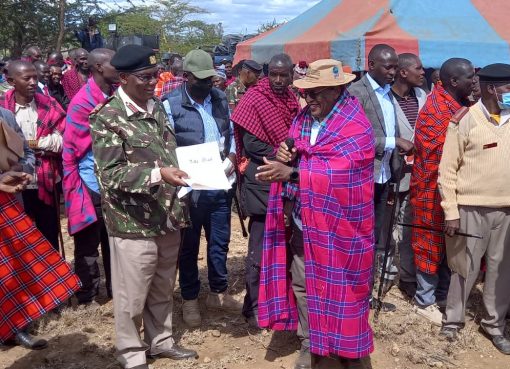Residents of Nairegie Enkare area in Narok East Sub County have been urged to take advantage of the ongoing rains and plant trees for sale to better their lives.
Speaking at Nairegie Enkare Catholic Church on Sunday during a tree planting exercise at the Narok County Natural Resource centre.
The Network Chairman, Nicholas Ole Murero called on the locals to use the ongoing rains to the maximum to plant fast maturing trees.
“We will be working closely with the Kenya Forest Service (KFS) to sensitize residents to plant and tender trees to boost their income and conserve the environment,” said Ole Murero.
He reiterated that the campaign will be rolled out to schools, churches and other institutions that will be encouraged to plant trees and conserve them until they are fully matured to prevent soil erosion.
During the event, over two hundred Catholic faithful planted over 1000 trees seedlings in the church compound and its environs.
Michael Letoya, a resident in the area said tree farming is equally profitable like food crop farming since it helps in
improving the soil quality and can be sold for firewood, timber and posts.
“We encourage residents to plant fast maturing trees that do well in this region like blue gum, Cyprus and graveria
species. We request the County Government to help the locals purchase the seedlings,” he said.
Speaking in his office, Narok County Ecosystem Conservator, Mwai Muraguri hailed the initiative terming it as a milestone in restoring the fast-diminishing forest cover.
“As a county we banned charcoal trade which was threatening our forests and we are glad that the national government is in support,” said Muraguri who warned locals against letting their livestock into the seedlings.
Muraguri challenged residents not to cut indigenous trees that they inherited from their parents as they help in improving on soil fertility.
“When you cut trees, massive soil erosion takes place threatening the fertility of your farm. This, forces farmers to
spend a lot of money to purchase manure to boost production which is very expensive,” said the environmentalist.
The ecosystem conservator said Kenya’s forest cover has increased from 6.9 per cent in 2013 to over 7.24 per cent in 2018, an improvement that has been attributed to the policy frameworks put in place to protect and preserve the ecosystems.
The Government still holds on the moratorium issued last year over logging which has seen success in control over logging and charcoal burning.
In July last year, over 300 families were evicted from Nkoben and Kosia part of Maasai Mau forest as the government targets to restore 23,000 hectares that had been encroached by illegal settlers.
Maasai Mau forest is the largest water tower in East and Central Africa and it’s the source of major rivers such as Mara River, Nyangores and Amolo, that are crucial for the Serengeti (Tanzania) and Masai Mara Game Reserves.
By Ann Salaton



